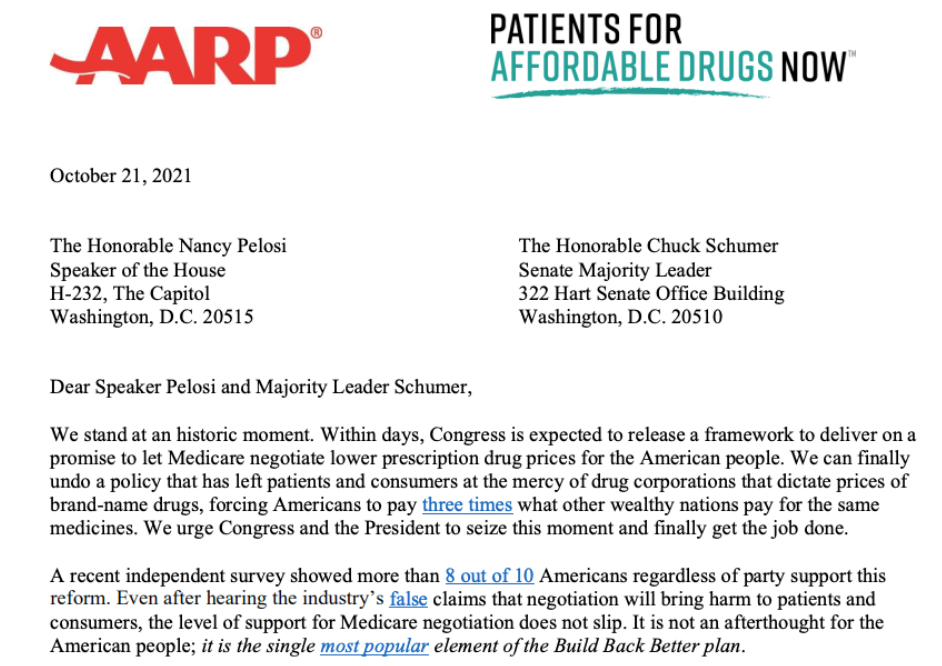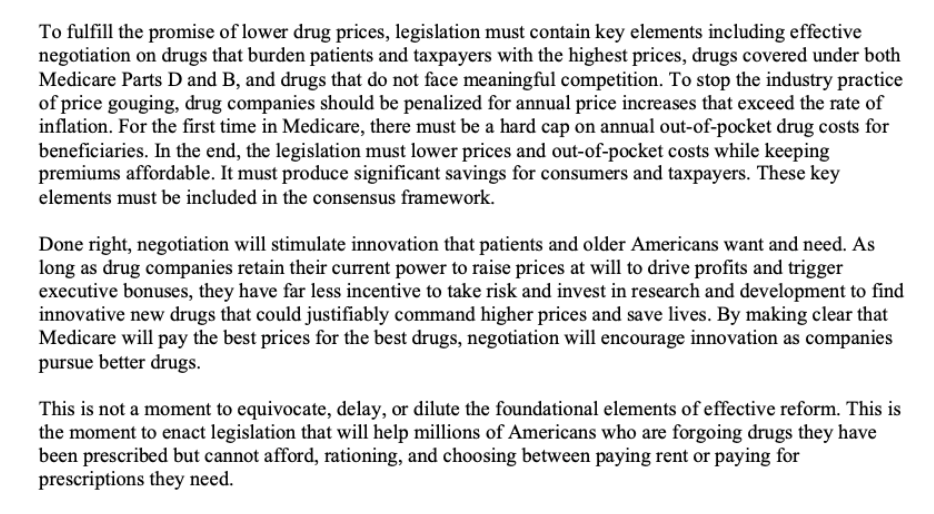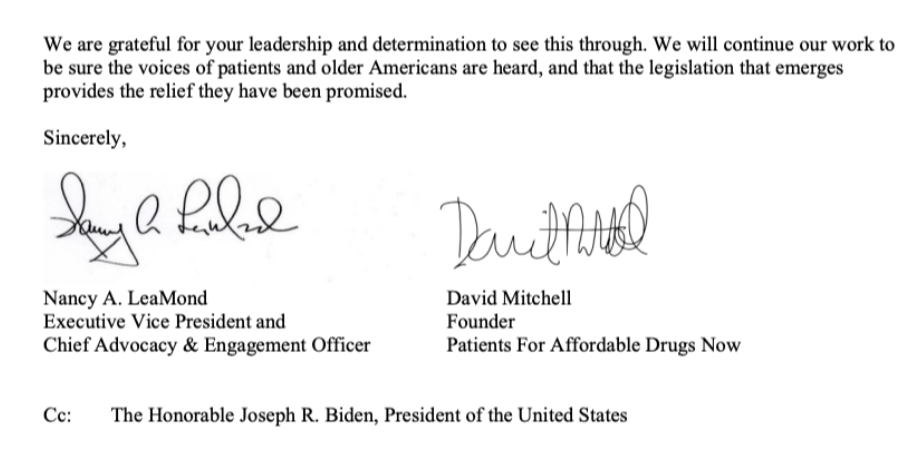
September 27, 2021
The Honorable Nancy Pelosi
Speaker of the House
H-232, The Capitol
Washington, D.C. 20515
Dear Speaker Pelosi,
As a national community of patients whose lives are directly affected by the high prices of prescription drugs in this country, we write to express our strong support for inclusion of strong and effective drug pricing measures in the Build Back Better Act — most importantly, direct Medicare negotiation. This historic moment and these comprehensive reforms offer a once-in-a-generation opportunity to deliver urgently needed relief to patients like us.
Too many of us struggle to afford prices that are almost four times what patients in other wealthy nations pay for the exact same brand-name drugs. Nearly 40 percent of Americans have trouble affording their prescription drugs, and more than 20 percent have had to take on debt or declare bankruptcy due to medication prices in the past year. We are grateful for innovative medicines that help manage our conditions and improve our health. But these statistics demonstrate our lived reality and compel us all to face a fundamental fact: Drugs don’t work if people can’t afford them.
The pharmaceutical industry wants us to believe we must choose: Let drug corporations have unfettered pricing power or say farewell to innovative new medicines. But that’s a false choice. Countless analyses have demonstratedthat it is possible to restore balance and achieve affordable medications without sacrificing true innovation. Medicare negotiation that pays the best prices for the best drugs would reward clinically meaningful new drugs and actually stimulate investment in innovation. The Build Back Better Act is complemented by the president’s budget, which would invest more funds in the National Institutes of Health to further stimulate research. Moreover, it is critical to remember that many patients can’t afford existing drugs they require today. As many as 1.1 million Americans will die in the next decade because they can’t afford needed medication.
We’re confident that inclusion of comprehensive drug pricing reforms in the reconciliation package will lower prices, save lives, and ensure continued development of innovative new drugs. The provisions under consideration will provide relief to Americans by allowing Medicare to negotiate directly with drug companies for lower prices, capping annual out-of-pocket costs in the Medicare prescription drug program, and stopping pharmaceutical price gouging by penalizing price increases that outpace inflation in both the private and public sectors.
Patients have waited too long. It’s time for Congress to deliver its promise to lower drug prices and let Medicare negotiate.
Signed:
Adeline Toevs, allergies, Buena Vista, CO
Allison Wheeler, type 1 diabetes and fibromyalgia, Gaithersburg, MD
Amy Miller, systemic lupus erythematosus, Grants Pass, OR
Andrea Nowakowski, Crohn’s disease, postural orthostatic tachycardia syndrome, depression, and traumatic brain injury, St. John, IN
Ann Neilson, chronic dry eye, fibromyalgia, osteoarthritis, back injury resulting in a discectomy and subsequently a lumbar fusion, Madras, OR
Anne Goddard, mother of a daughter with type 1 diabetes, Haverhill, MA
Ashley Suder, systemic lupus erythematosus, Morgantown, WV
Becky Hall, metastatic breast cancer, Capitola, CA
Candice Brown, ulcerative colitis, Alexandria, VA
Caroline Walsh, Turner syndrome, psoriatic arthritis, and celiac disease, Quincy, MA
Catherine Benitz, Sjogren’s syndrome, Greeley, CO
Cayley Winters, type 1 diabetes, Battle Creek, MI
Chris Burgess, psoriatic arthritis, Chicago, IL
Chuck Hurley, myasthenia gravis, Annapolis, MD
Clayton McCook, father of a daughter with type 1 diabetes, Edmond, OK
Connie Lindy, Xarelto patient, Middletown, DE
Dan Kass, diabetes, Mission, KS
David Mitchell, multiple myeloma, Bethesda, MD
Deanna Robinson, chronic lymphocytic leukemia and type 2 diabetes, Mazeppa, MN
Deb Withrow, interstitial cystitis, International Falls, MN
Debra Armus, bipolar disorder, Delray Beach, FL
Debra Ford, adrenocortical carcinoma, Nanuet, NY
Dirk Last, type 1 diabetes, Minneapolis, MN
Donald M. Kreis, parent of person with cystic fibrosis, Concord, NH
Donna L. Pingrey, chronic pain and pacemaker, Colusa, CA
Donna Renfroe, acid reflux and high cholesterol, Atlanta, GA
Elaine Pierce, glaucoma, San Antonio, TX
Elizabeth Kanfush, blood clotting disorder, Monaca, PA
Ella Westerfield, asthma and chronic migraine, Denver, CO
Emily Grant, cystic fibrosis, Dallas, TX
Gail deVore, type 1 diabetes, Denver, CO
Gary Gross, polycythemia vera, Montgomery, OH
Genevieve Scott, ulcerative colitis, Charlotte, NC
Ginny Boynton, Lambert-Eaton myasthenic syndrome, Mechanicsburg, PA
Glenda Smith, chronic obstructive pulmonary disease, Kennebunk, ME
Hailey Adkisson, mother of Juniper, who has a rare form of epilepsy, Salem, OR
Hattie Saltzman, type 1 diabetes, Kansas City, MO
Heidi Daniels, diabetes, Arlington, MA
Heidi Kendall, chronic myeloid leukemia, Portola Valley, CA
Helen Sgarlat, spondylolisthesis, spondylitis, and degenerative disc disease, Forty Fort, PA
Iesha Meza, type 1 diabetes, Phoenix, AZ
Jacqueline Garibay, ankylosing spondylitis, Austin, TX
Jacqueline Gray, caregiver, Portland, OR
Jacqueline Trapp, multiple myeloma, Muskego, WI
Jacquie Persson, Crohn’s disease, Waterloo, IA
Janet Kerrigan, RN, advocate, and ambassador for patients and families dealing with myeloma, Myrtle Beach, SC
Janet Schwartz, multiple sclerosis and type 2 diabetes, Newark, DE
Jay Gironimi, cystic fibrosis and diabetes, Groton, CT
Jayme Thode, spina bifida, Quechee, VT
Jesse Nagel, father of a person with type 1 diabetes, Belle Harbor, NY
Joan Raider, chronic obstructive pulmonary disease, heart failure, atrial fibrillation, lung cancer, stage 4 kidney failure, diabetes, thyroid deficiency, and arthritis, Carrollton, GA
Joan Tramontano, gastrointestinal stromal tumor, Venice, FL
Joanna Olson, B-cell lymphoma, Beaverton, OR
John Meaney, 5q minus syndrome, Bonita, CA
Joyce Allex Schultz, multiple myeloma, Ceylon, MN
Julia Bartow, Crohn’s disease and gastroparesis, Boston, MA
Dr. Julia Blanchette, type 1 diabetes, Cleveland Heights, OH
Julie F. Miller, multiple sclerosis and Crohn’s disease, Providence, RI
Justine Miner, type 2 diabetes, Bristol, CT
Karolina Chorvath, Crohn’s disease, Boston, MA
Kat Schroeder, type 1 diabetes, Arlington, VA
Katherine Pepper, asthma, diabetes, and gastroparesis, Bellingham, WA
Keith Van Houten, father of a son with Duchenne muscular dystrophy, West Bloomfield Township, MI
Kelly Shanahan, metastatic breast cancer, South Lake Tahoe, CA
Ken Oleksa, multiple myeloma, atrial fibrillation, and glaucoma, Gibsonia, PA
Kimberly Ishoy, type 1 diabetes, South Jordan, UT
Kirk Tinsley, type 2 diabetes, Bowling Green, KY
Kolton Chapman, ulcerative colitis, type 2 diabetes, Moyamoya disease, Pickerington, OH
Kristen Smith, mother to children with autism spectrum disorder and type 1 diabetes, Plymouth, MA
Kristina Caffrey, Gaucher disease, Albuquerque, NM
Kristopher Fabian Garcia, asthma, Denver, CO
L. Rose McMahan, asthma and type 2 diabetes, Fairfield, CA
Lauren Stanford, type 1 diabetes, Washington, DC
Laurie Rozgonyi, chronic diarrhea, Mill Creek, WV
Leah Clark, Crohn’s disease, Ann Arbor, MI
Lesley A. Nadeau, multiple sclerosis, Royal Oak, MI
Lija Greenseid, parent of child with type 1 diabetes, Saint Paul, MN
Lisa Trainor, post-traumatic stress disorder and attention-deficit/hyperactivity disorder, Princeton, NJ
Lisette Pylant, nerve pain disorder and post-traumatic stress disorder, Andover, MA
Liz Westerfield, asthma, Rockland, ME
Loree Ulrich, multiple sclerosis, Saint Charles, MO
Lori Dumont, sister of a person with type 1 diabetes, Brewer, ME
Lori Lee Roden, mother of a person with type 1 diabetes, Madison, WI
Lucy Gibson, type 1 diabetes, Washington, DC
Lucy Westerfield, irritable bowel syndrome, Washington, DC
Luz Lopez, chronic fibromyalgia and cervical and lumbar radiculopathy, Phoenix, AZ
Lynn Scarfuto, chronic lymphocytic leukemia, Herkimer, NY
Marcus LaCour, type 1 diabetes, Cincinnati, OH
Margaret Wright-Mueller, fibromyalgia, pinched nerves, and lupus, Littleton, CO
Maria Sanchez, diabetes, Atlanta, GA
Mary Mack, heart transplant recipient, Nantucket, MA
Matt Navey, Crohn’s disease, Durham, NC
Maureen Iten, seizure disorder, non-Hodgkin’s lymphoma, and follicular thyroid cancer, Shoreview, MN
Meg Jackson-Drage, fibromyalgia, Magna, UT
Melissa Evans, asthma and kidney disease, Wilkes-Barre, PA
Melissa Fleming, multiple myeloma, Morgantown, WV
Michelle Rzeplinski, diabetes, Pottsville, PA
Mike Nielsen, husband of wife with hepatitis C, Bend, OR
Miriam Wolfe, Crohn’s disease and chronic pain, York, ME
Moira McCarthy Stanford, mother of a person with type 1 diabetes, Plymouth, MA
Nancy Cartwright, widow of multiple myeloma patient, Las Vegas, NV
Natasha Yoder, several conditions, Lancaster, PA
Nicole Smith-Holt, mother of son who died from rationing insulin, Richfield, MN
Nilton Leon, type 2 diabetes, Santa Ana, CA
Noelle Tuominen, mother of two children with type 1 diabetes, Livermore, CA
Norma Alicea Berrios, type 2 diabetes, Copperas Cove, TX
Pamela Holt, multiple myeloma, Granger, IN
Patricia McKenzie, type 2 diabetes, Lithonia, GA
Patricia Tenney, chronic allergies and sinusitis, Holyoke, MA
Patrick Lewis, obsessive-compulsive disorder, Davenport, IA
Paul Kleutghen, primary plasma cell leukemia, Southport, NC
Pranav Pinapala, type 1 diabetes, Houston, TX
Rachel Burnett, Crohn’s disease, Pittsburgh, PA
Rachel Clark, type 1 diabetes, Arlington, VA
Rachel Conner, obsessive-compulsive disorder, Nashville, TN
Ramae Hamrin, multiple myeloma, Bemidji, MN
Randall Barker, type 1 diabetes, Iowa Park, TX
Rebecca Hovde, Lambert-Eaton myasthenic syndrome, Wellman, IA
Robert Fowler, multiple myeloma, North Ridgeville, OH
Robert Krawetzki, diabetes and spinal stenosis, Berlin Heights, OH
Robert Porter, multiple myeloma, Mackinaw, IL
Ronit Zemel, chronic dry eye, Falls Church, VA
Rose Keller, cystic fibrosis, Norwich, VT
Russell Saltzman, type 1 diabetes, Kansas City, MO
Sa’Ra Skipper, type 1 diabetes, Indianapolis, IN
Sabrina Burbeck, mother of son with type 1 diabetes, Old Town, ME
Sam McLaren-Fahey, Lyme disease, celiac disease, chronic inflammatory response syndrome, and hypothyroidism, Washington Township, MI
Samantha M. Sawyer, spondyloarthritis, Boston, MA
Samantha Norris-Dubrul, B.A.A, J.D., Hodgkin’s lymphoma, Macomb Township, MI
Samantha Rynearson, Crohn’s disease, North Platte, NE
Sandra Killett, multiple myeloma, New York, NY
Sanie Mikaelian, blood cancer, San Francisco, CA
Sarah Duhart Clarke, type 1 diabetes, hypothyroidism, and attention-deficit/hyperactivity disorder, Vancouver, WA
Sascha Martin, type 1 diabetes, Providence, RI
Savanna Braun, severe allergic asthma and psoriatic arthritis with spondylitis and enthesitis, The Woodlands, TX
Scarlett Woodard, multiple sclerosis, Albany, GA
Scott Ensworth, cardiac amyloidosis, Beaver Falls, PA
Sharon Brown, pulmonary hypertension, Kingsport, TN
Sheila Porter, multiple myeloma, Mackinaw, IL
Sheldon Armus, atrial fibrillation, Boynton Beach, FL
Sneha Dave, ulcerative colitis, Greenwood, IN
Stacey Nagel, mother of a person with type 1 diabetes, Belle Harbor, NY
Stahis Panagides, Ph.D., Parkinson’s disease, Bethesda, MD
Stephanie Shavers, type 1 diabetes, Olathe, KS
Steven Alton, severe migraines, Albuquerque, NM
Steven Craig Hadfield, rare blood cancer and type 2 diabetes, Charlotte, NC
Sue Knipmeyer, diabetes, Fargo, ND
Sue Lee, plaque psoriasis, Crestwood, KY
Susan Fariss, metastatic breast cancer, Washington, DC
Taylor Dean, erythromelalgia and allodynia, Jackson, MI
Therese Humphrey Ball, multiple sclerosis, Ogden Dunes, IN
Toni Neill, multiple sclerosis, Petoskey, MI
Tony Mills, diabetes, reactive respiratory disease, kidney disease, high blood pressure, and heart and thyroid complications, Rockport, TX
Tori Saylor, multiple sclerosis, Washington, DC
Travis Paulson, type 1 diabetes, Eveleth, MN
Valerie Gacula, rheumatoid arthritis, fibromyalgia, and bipolar disorder, Long Beach, CA
Vanessa Ladson, fibromyalgia and lupus, Dover, DE
Victoria Stuessel, multiple sclerosis, La Puente, CA
Vivian Fiorito, chronic obstructive pulmonary disease, Benton, AR
Xanadu Roque, type 1 diabetes, Gainesville, FL
CC:
The Honorable Joseph R. Biden, President of the United States
The Honorable Richard Neal, Chair, House Ways and Means Committee
The Honorable Frank Pallone, Chair, House Energy and Commerce Committee
The Honorable Charles Schumer, Majority Leader, United States Senate
The Honorable Ron Wyden, Chair, Senate Finance Committee |



